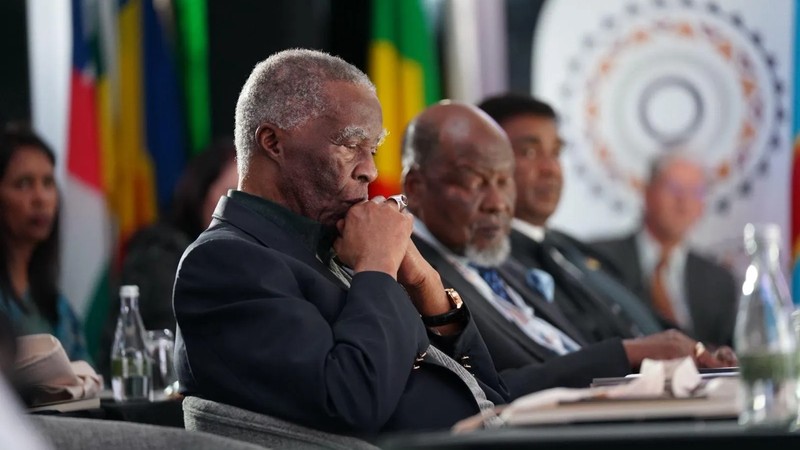Former President Thabo Mbeki’s recent impassioned plea for an overhaul of South Africa’s presidential election process has ignited a discussion within the ANC, as the party grapples with its own internal renewal strategies and the broader call for a national dialogue to address the country’s multifaceted crises.
Mbeki, speaking at the launch of the National Dialogue for the Eastern Cape higher education sector at Nelson Mandela University at the weekend, said that the current method of electing the President is “wrong” and fails to adequately assess a candidate’s capability and suitability for the highest office.
Mbeki’s comments, directly challenge the existing system where South African voters elect political parties to fill 400 seats in the National Assembly, with the President then chosen by a majority of Members of Parliament (MPs).
“The manner in which we elect the President is wrong,” Mbeki said.
“The question is never asked if a President is capable and a fit and proper person.” He vividly recalled his own experience, stating, “When Parliament said I must become president, they did not have a clue what I was capable of doing, and they never asked,” Mbeki said.
While the party has not officially responded to Mbeki’s specific proposal for a direct presidential election by the populace, an ANC National Executive Committee (NEC) member, who requested anonymity, confirmed that the party has already initiated discussions around the matter.
“It’s a matter that the NEC and the National Working Committee (NWC) should discuss,” the source said.
“We are looking into new strategies on how to renew the party, and so the former president’s assertions are not far-fetched.” The source said.
“The country needs to renew its democratic processes. As to how that will happen needs to be discussed by the organisation’s higher structures.”
Mbeki highlighted the economy, politics, crime and corruption, and even continental relations as areas in deep distress, concluding, “There is nothing that does not say crisis.”
He argued that political parties alone do not have the answers, emphasising, “Answers can only come from the people, not political parties.”
Mbeki’s assertions also criticised the perceived intellectual void within political leadership, particularly regarding the implementation of key national strategies.
He lamented that the National Development Plan (NDP), adopted by Cabinet in 2012 as a roadmap for development by 2030, was a “brilliant vision” but “not a plan” – a failing he attributed to the “intelligentsia’s fault” for not intervening.
He sees the National Dialogue as an opportunity for the country’s scholars and civic leaders to “provide tangible, practical solutions” and change the narrative that “black people always fail”.
Political analyst Professor Steven Friedman weighed in on Mbeki’s intervention, suggesting that the former president’s focus on competence and the election method is a timely one.
“Mbeki’s critique highlights a fundamental flaw in a purely parliamentary system, where party loyalty can sometimes overshadow individual merit when it comes to selecting the head of state,” Friedman said.
“The ANC’s apparent willingness to discuss this internally suggests a recognition that the current system, while democratic, might not always produce the most effective leadership, particularly in times of profound crisis.”
Friedman said that a direct election could potentially enhance accountability and the President’s mandate, making them directly answerable to the electorate rather than primarily to their party.
Another analyst, Sithembile Mbete, said Mbeki’s suggestion would require a change to the Constitution.
“While Mbeki raises valid concerns about the assessment of presidential candidates, the implementation of a direct election system would be a significant constitutional amendment with far-reaching implications,” Mbete said.
“It would fundamentally alter the relationship between the executive and the legislature, and could lead to new forms of political dynamics, both positive and negative.”
She cautioned that while direct elections might increase public participation, careful consideration would be needed to ensure that such a system doesn’t inadvertently centralise too much power in the presidency or undermine the role of Parliament.
“The ANC’s internal deliberations will need to weigh these complex factors,” Mbete said.
